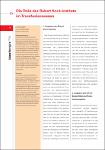Die Rolle des Robert Koch-Instituts im Transfusionswesen
Offergeld, Ruth
Burger, Reinhard
Das Robert Koch-Institut (RKI) erhebt und bewertet infektionsepidemiologische Daten von Blutspendern als wichtiger Bestandteil eines Hämovigilanzsystems. Die Analyse von transfusionsrelevanten Infektionen in der Spenderpopulation liefert wichtige Hinweise für die Modifi kation von Spenderauswahl und -testkriterien. Über die Analyse der Meldedaten hinaus führt das RKI in Zusammenarbeit mit den Spendeeinrichtungen wichtige ergänzende epidemiologische Studien unter Blut- und Plasmaspendern durch. Weiterhin ist mit dem Arbeitskreis Blut ein wichtiges Expertengremium am Robert Koch-Institut angesiedelt, das Voten und Stellungnahmen zu aktuellen und wichtigen Themen der Transfusionsmedizin erarbeitet und die Behörden des Bundes und der Länder in Fragen der Transfusionssicherheit berät. The Robert Koch Institute (RKI) collects and evaluates epidemiological data from blood and plasma donors as an important part of the haemovigilance system. The analysis of infections in the donor population can contribute to the modifi cation of donor selection criteria and screening algorithms. In addition to the mandatory epidemiological data, the RKI conducts important supplementary studies with blood and plasma donors. Furthermore, the National Advisory Committee “Blood” (Arbeitskreis Blut) is affi liated with the RKI. The experts of this committee publish recommendations and statements dealing with current and important topics and advise the national and federal health authorities in matters of transfusion safety concerning both infections transmitted by blood and safe blood supply.
Dateien zu dieser Publikation
Keine Lizenzangabe

